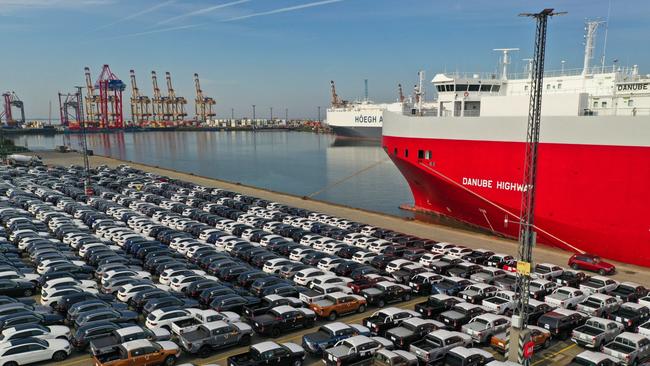The new car price haggle is being killed off, and might never come back
What’s the best price you can do? How much have you got? Haggling over the price of a new car is dead as a dodo at the moment.

Business
Don't miss out on the headlines from Business. Followed categories will be added to My News.
For the next couple of years at least, and perhaps indefinitely, the notion of haggling over the price of a new car is dead.
This will be music to the ears of the large cohort of the community which dreads the inevitable back and forth that used to come at the end of any new vehicle purchase, which came loaded with the promise of walking out of the dealership thinking you’d been had.
It’s not so great for anyone who thinks they’re a great dealmaker and, perhaps surprisingly, for the vehicle manufacturers who you’d assume might be happy to have the upper hand it’s anything but a reason to celebrate right now, due to the reasons that have brought it into being.
In the longer term, it might be a different story.
With huge delays in vehicle production, leaving dealerships unable to put firm dates around delivery, and some fundamental shifts in how the industry itself sells cars, the pandemic may well be the trigger for a seismic shift in how consumers buy a new car.
The two key factors at play are of course the aforementioned production delays, as well as a move towards fixed price and even online car purchasing, with Mercedes-Benz courageously leading the charge on fixed pricing in Australia – a situation that has developed into a $650m court case.
Let’s initially look at the experience of some acquaintances who have sought to buy new cars in Australia recently.
One, an astute negotiator who was in the market for a mid-range European saloon, was lucky enough to find one on the shop floor a few months ago.
Approaching the end of the process and, I’m assuming (with some poetic licence), having recently skimmed through his copy of “Getting to Yes”, made an offer he thought would be a good starting point.
Once the salesman had stopped laughing and picked himself up off the floor, he explained that there were literally three or four of that model in the nation for sale, and likely another hundred or so customers who’d gladly pay the ticket price.
Another who put in an order for a luxury SUV a few months ago has been told that they “hope to” start building it early next year. That manufacturer was offering faster delivery times if the car was “de-specced”, with every decision that took a computer chip out having the potential to speed up the delivery date.
And another story, third-hand this time, tells of a Toyota dealer who called a recent Landcruiser purchaser and offered to buy it back from them for about what they’d paid, months after the purchase. So much for the old rule of thumb that vehicles lose a third of their value once they’re driven off the lot.
Car manufacturers have been smashed by both the global computer chip shortage, as well as the chaos surrounding the world’s shipping industry, with the result that they’re in the ignominious position of having to greatly manage expectations for new car buyers.
Toyota now has a “vehicle delays and availability” page on its Australian website that warns of long delivery times and advises prospective purchasers to contact their local dealer or search its database of certified pre-owned vehicles. There you can pick up a 2017 Landcruiser VX with 32,600km on the clock for $112,990 – about $14,000 more than they were advertised for new, according to vehicle valuation site RedBook.
Then there’s the move announced earlier this year by Mercedes-Benz that it would move from a franchise model in Australia to an agency model and sell cars at a fixed price, which resulted in a $650m lawsuit brought by 41 of the 53 dealers in Australia.
Under the proposed model, dealers will no longer purchase cars from Mercedes to resell to consumers – Mercedes will retain ownership of the vehicles, which the dealer sells on to the consumer for a fix priced in exchange for a commission.
The strategy mimics the fight Tesla picked in the US, where in many states direct sales of vehicles by manufacturers are outlawed, in favour of a franchise model.
Several US states are now looking to legislate to allow direct sales, and naturally there is a fear that if Mercedes is successful in Australia it will be the first domino to fall, posing a potentially existential threat to the franchise model.
For those of us like the eponymous protagonist in Life of Brian who have neither the time nor the inclination to haggle, the shift to a fixed price model will be a blessing. Longer term it might also be to the benefit of the manufacturers themselves, while their franchise stakeholders risk wearing much of the downside.
Originally published as The new car price haggle is being killed off, and might never come back





